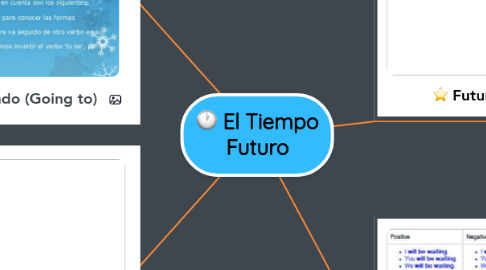El Tiempo Futuro
por Giorgelis Martins Alvarez


1. Futuro Planificado (Going to)
1.1. Se usa en inglés para un futuro ya planeado, una intención, o algo que es obvio que va a pasar.
1.2. Estructura Afirmativa: SUJETO + am/are/is going to +VERBO EN INFINITIVO
1.2.1. Ej: I am going to eat banana.
1.3. Estructura Negativa:SUJETO + am/are/is not going to + VERBO EN INFINITIVO
1.3.1. Ej: I am not going to dance tonight
1.4. Estructura Interrogativa:am/are/is + SUJETO + going to + VERBO EN INFINITIVO ?
1.4.1. Ej: Are you going to study tomorrow?
2. Futuro Perfecto
2.1. Este tiempo se usa para referirnos a una situación que se dará por finalizada en un momento dado en el futuro.
2.2. Estructura Afirmativa: Sujeto + WILL + HAVE + PARTICIPIO PASADO
2.2.1. Ej: I will have gone to Brazil.
2.3. Estructura Negativa: Sujeto + *WON’T + HAVE + PARTICIPIO PASADO
2.3.1. Ej: I won't have met you.
2.4. Estructura Interrogativa: WILL + Sujeto + HAVE + PARTICIPIO PASADO?
2.4.1. Ej: Will She have forgotten her bag?
3. Futuro Simple
3.1. Es un tiempo verbal que se utiliza para describir acciones que se van a desarrollar en el futuro sin necesidad de aclarar en que momento se producirán.
3.2. Estructura Afirmativa: Sujeto + “will” + verbo principal
3.2.1. EJ: I will call you tonight.
3.3. Estructura Negativa: Sujeto + “will” + “not” + verbo principal
3.3.1. Ej: I will not drink beers.
3.4. Estructura Interrogativa: “Will” + sujeto + verbo principal?
3.4.1. Ej: Will you travel to China?
4. Futuro Continuo
4.1. Es un tiempo verbal que se utiliza para describir una acción que tendrá lugar en el futuro, que puede especificarse o no, y que seguirá desarrollándose en ese momento
4.2. Estructura Afirmativa: Sujeto + “will be” + verbo+ing…
4.2.1. Ej: They will be learning english.
4.3. Estructura Negativa: Sujeto + “will” + “not” + “be” + verbo+ing…
4.3.1. Ej: I will not be dance.
4.4. Estructura Interrogativa:Verbo auxiliar “will” + sujeto + "be"+ verbo+ing…?
4.4.1. Ej:Will he be eating salad?

